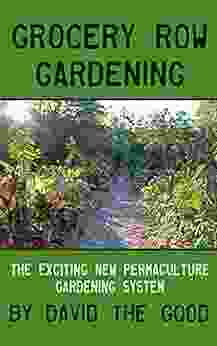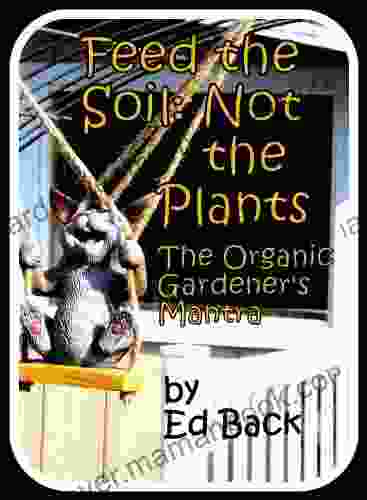The Organic Gardener Mantra: A Comprehensive Guide to Sustainable Gardening Practices

: Embracing the Organic Gardening Philosophy
Organic gardening is a holistic approach to cultivation that prioritizes the health of the soil, the environment, and the produce. By adhering to organic principles, gardeners can create a thriving ecosystem that supports biodiversity, reduces reliance on synthetic chemicals, and yields nutritious food. This article serves as a comprehensive guide to the organic gardener mantra, providing insights into its principles, benefits, and practical applications.
4.4 out of 5
| Language | : | English |
| File size | : | 101 KB |
| Text-to-Speech | : | Enabled |
| Screen Reader | : | Supported |
| Enhanced typesetting | : | Enabled |
| Print length | : | 9 pages |
| Lending | : | Enabled |
Principle 1: Soil Health as the Foundation
Healthy soil is the cornerstone of organic gardening. It provides nutrients, moisture, and support for plants, while also hosting a diverse community of microorganisms essential for ecosystem balance. Organic gardeners prioritize soil health by:
- Using organic matter: Compost, manure, and other organic materials improve soil structure, fertility, and water retention.
- Avoiding synthetic fertilizers: Chemical fertilizers can damage soil structure, reduce microbial activity, and contribute to nutrient pollution.
- Practicing crop rotation: Rotating different plant families in the same bed over time helps prevent soil depletion and disease buildup.
- Minimizing soil disturbance: Tillage can disrupt soil structure and damage beneficial microorganisms. Using no-till or reduced-till methods is recommended.
Principle 2: Natural Pest Control Strategies
Organic gardeners rely on natural methods to manage pests and diseases, minimizing the use of harmful synthetic pesticides. These strategies include:
- Companion planting: Planting certain plant species together can repel pests or attract beneficial insects.
- Beneficial insects: Ladybugs, parasitic wasps, and other insects prey on pests, providing natural pest control.
- Organic pesticides: When necessary, organic pesticides derived from natural sources (e.g., neem oil, pyrethrum) can be used with caution.
- Cultural practices: Proper sanitation, crop rotation, and timely harvesting can help reduce pest infestations.
Principle 3: Biodiversity for a Balanced Ecosystem
Biodiversity is crucial for a healthy garden ecosystem. A diverse range of plants, animals, and microorganisms provides resilience against pests, diseases, and environmental stressors. Organic gardeners promote biodiversity by:
- Planting a variety of species: Including both native and non-native plants attracts beneficial insects and wildlife.
- Creating wildlife habitats: Providing nesting boxes, water features, and brush piles supports biodiversity.
- Encouraging pollinators: Planting flowers and avoiding pesticide use is essential for bee and butterfly populations.
- Protecting natural enemies: Beneficial insects, such as ladybugs and lacewings, need shelter and food to thrive.
Benefits of Organic Gardening
Embracing the organic gardener mantra offers numerous benefits, including:
Healthier Produce:
Organic fruits and vegetables contain higher levels of vitamins, minerals, and antioxidants compared to conventionally grown produce.
Improved Soil Health:
Organic practices enhance soil structure, biodiversity, and water retention, leading to long-term soil productivity.
Reduced Environmental Impact:
Organic gardening minimizes water pollution, greenhouse gas emissions, and soil degradation associated with synthetic chemicals.
Increased Biodiversity:
Organic gardens support a wide range of plant and animal species, fostering a balanced ecosystem.
Personal Satisfaction:
Growing and consuming organic produce provides a sense of accomplishment and connection with the natural world.
Practical Applications of the Organic Gardener Mantra
Implementing organic gardening practices requires a shift in mindset and a commitment to sustainable principles. Some practical tips include:
- Start small: Begin by converting a portion of your garden or starting a container garden.
- Create compost: Compost kitchen scraps, yard waste, and other organic materials to enrich the soil.
- Use organic mulches: Cover the soil around plants with organic materials like straw, wood chips, or compost to suppress weeds and retain moisture.
- Attract beneficial insects: Plant flowers and herbs that attract pollinators and natural pest control agents.
- Water wisely: Mulching, drip irrigation, and rainwater harvesting help conserve water and reduce evaporation.
: A Sustainable Path to a Thriving Garden
The organic gardener mantra is a holistic approach to cultivation that aligns with the principles of sustainability, environmental stewardship, and personal well-being. By embracing these principles and implementing practical applications, gardeners can create thriving ecosystems that yield nutritious food, support biodiversity, and protect the environment for generations to come. Whether you're a seasoned gardener or just starting out, the organic gardener mantra provides a roadmap to a sustainable and rewarding gardening experience.
4.4 out of 5
| Language | : | English |
| File size | : | 101 KB |
| Text-to-Speech | : | Enabled |
| Screen Reader | : | Supported |
| Enhanced typesetting | : | Enabled |
| Print length | : | 9 pages |
| Lending | : | Enabled |
Do you want to contribute by writing guest posts on this blog?
Please contact us and send us a resume of previous articles that you have written.
 Top Book
Top Book Novel
Novel Fiction
Fiction Nonfiction
Nonfiction Literature
Literature Paperback
Paperback Hardcover
Hardcover E-book
E-book Audiobook
Audiobook Bestseller
Bestseller Classic
Classic Mystery
Mystery Thriller
Thriller Romance
Romance Fantasy
Fantasy Science Fiction
Science Fiction Biography
Biography Memoir
Memoir Autobiography
Autobiography Poetry
Poetry Drama
Drama Historical Fiction
Historical Fiction Self-help
Self-help Young Adult
Young Adult Childrens Books
Childrens Books Graphic Novel
Graphic Novel Anthology
Anthology Series
Series Encyclopedia
Encyclopedia Reference
Reference Guidebook
Guidebook Textbook
Textbook Workbook
Workbook Journal
Journal Diary
Diary Manuscript
Manuscript Folio
Folio Pulp Fiction
Pulp Fiction Short Stories
Short Stories Fairy Tales
Fairy Tales Fables
Fables Mythology
Mythology Philosophy
Philosophy Religion
Religion Spirituality
Spirituality Essays
Essays Critique
Critique Commentary
Commentary Glossary
Glossary Bibliography
Bibliography Index
Index Table of Contents
Table of Contents Preface
Preface Introduction
Introduction Foreword
Foreword Afterword
Afterword Appendices
Appendices Annotations
Annotations Footnotes
Footnotes Epilogue
Epilogue Prologue
Prologue Lazaros Blank Books
Lazaros Blank Books Jeremy Taylor
Jeremy Taylor Nicola Aliani
Nicola Aliani Marie Wilkens
Marie Wilkens Raven Mcallan
Raven Mcallan Bradley Stone
Bradley Stone Michael Ford
Michael Ford David Kinch
David Kinch Kimberly Chrisman Campbell
Kimberly Chrisman Campbell Taste Of Home
Taste Of Home Sally Augustin
Sally Augustin Peter R Hall
Peter R Hall Caleb J Ross
Caleb J Ross Christina Wu
Christina Wu Sierra Demulder
Sierra Demulder Paula Polk Lillard
Paula Polk Lillard Michael R G Spiller
Michael R G Spiller Christof Weber
Christof Weber David The Good
David The Good Evan Hundhausen
Evan Hundhausen
Light bulbAdvertise smarter! Our strategic ad space ensures maximum exposure. Reserve your spot today!

 Elias MitchellHow To Build An Inexpensive Chicken Feeder: A Step-by-Step Guide With Visuals
Elias MitchellHow To Build An Inexpensive Chicken Feeder: A Step-by-Step Guide With Visuals
 Shannon SimmonsFrench Epic Allegory: A Kaleidoscope of Meaning in Medieval and Renaissance...
Shannon SimmonsFrench Epic Allegory: A Kaleidoscope of Meaning in Medieval and Renaissance... Isaiah PriceFollow ·19.6k
Isaiah PriceFollow ·19.6k Kendall WardFollow ·4.7k
Kendall WardFollow ·4.7k Virginia WoolfFollow ·5.3k
Virginia WoolfFollow ·5.3k William PowellFollow ·5.7k
William PowellFollow ·5.7k John MiltonFollow ·15.6k
John MiltonFollow ·15.6k Logan CoxFollow ·5.2k
Logan CoxFollow ·5.2k Robert FrostFollow ·10.4k
Robert FrostFollow ·10.4k Devon MitchellFollow ·2.8k
Devon MitchellFollow ·2.8k

 Eugene Powell
Eugene PowellComplete Guide to Using Yoga With Kids: Benefits, Tips,...
Yoga is an ancient practice that has been...

 Benji Powell
Benji PowellHow to Make $000 Per Week on Craigslist
Are you looking for a way to make extra money...

 Gabriel Garcia Marquez
Gabriel Garcia MarquezGrocery Row Gardening: The Exciting New Permaculture...
Kick-start your gardening journey with the...

 Hayden Mitchell
Hayden MitchellUnveiling the Gripping World of Winterwood: Ben Hood...
In the annals of crime thrillers, the...

 E.M. Forster
E.M. ForsterThe Financial Advisor Guide To Managing and Investing...
As a financial...

 Lee Simmons
Lee SimmonsIn My Shoes Memoir: A Poignant Journey of Resilience,...
In the tapestry of life, adversity often...
4.4 out of 5
| Language | : | English |
| File size | : | 101 KB |
| Text-to-Speech | : | Enabled |
| Screen Reader | : | Supported |
| Enhanced typesetting | : | Enabled |
| Print length | : | 9 pages |
| Lending | : | Enabled |








